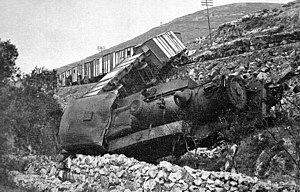Jewish insurgency in Palestine
| Jewish insurgency in Mandatory Palestine | |||||
|---|---|---|---|---|---|
| Part of Sectarian conflict in Mandatory Palestine | |||||
 Palestine Railway K class 2-8-4T steam locomotive and freight train derailed from the Jaffa and Jerusalem line after being sabotaged by Jewish insurgents in 1946 |
|||||
|
|||||
| Belligerents | |||||
| Commanders and leaders | |||||
|
|
Menachem Begin Amichai Paglin Yitzhak Shamir Eitan Livni Nathan Yellin-Mor Moshe Sneh Yisrael Galili |
||||
| Strength | |||||
|
British police: 4,000 policemen British Armed Forces: 100,000 troops (peak strength) |
Haganah: 21,000 troops Irgun: 4,000 troops Palmach: 3,000 troops Lehi: 500 troops Total forces: About 28,500 |
||||
| Casualties and losses | |||||
| 338 British soldiers, police officers, and civilians killed | 50-100 militants and civilians killed 2,755 arrested 11 executed |
||||
The Jewish insurgency in Mandatory Palestine involved paramilitary actions carried out by Jewish underground groups against the British forces and officials in Mandatory Palestine between 1939 and 1948. The tensions between Jewish militant underground organizations and the British mandatory authorities rose from 1938 and intensified with the publication of the White Paper of 1939, which outlined new government policies which placed further restrictions on Jewish immigration and land purchases and declared the intention of giving independence to Palestine, with an Arab majority, within ten years. Though World War II brought relative calm, the tensions again escalated into an armed struggle towards the end of the war, when it became clear that the Axis Powers were close to defeat. The conflict lasted until the termination of the British Mandate for Palestine and the establishment of the State of Israel in May 1948.
The armed conflict escalated during the final phase of the World War II, when the Irgun declared a revolt in February 1944, ending the hiatus in operations it had begun in 1940. Starting from the assassination of Lord Moyne in 1944, the Haganah actively opposed the Irgun and Lehi, in a period of inter-Jewish fighting known as The Hunting Season. However, in autumn 1945, after the end of the war the Haganah began a period of co-operation with the two other underground organizations, forming the Jewish Resistance Movement. The Haganah refrained from direct confrontation with British forces, and concentrated its efforts on attacking British immigration control, while Irgun and Lehi attacked military and police targets. The Resistance Movement dissolved in recriminations in July 1946 following the King David Hotel bombing, with Irgun and Lehi acting independently, while the main underground militia Haganah acted mainly in supporting Jewish immigration to Mandatory Palestine. After the UN partition plan resolution was passed on 29 November 1947, the civil war between Palestinian Jews and Arabs eclipsed the previous tensions of both with the British.
...
Wikipedia
